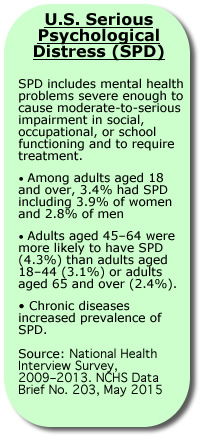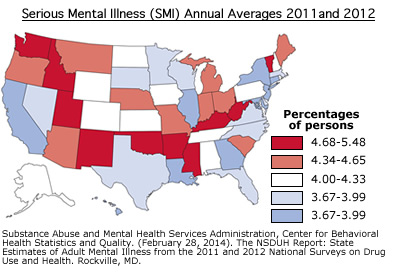 Currently more than 80% of state Boards of Nursing offer an alternative to discipline program for nurses with impairment, 22 include mental health (psychiatric issues) in their definition of impairment.
Currently more than 80% of state Boards of Nursing offer an alternative to discipline program for nurses with impairment, 22 include mental health (psychiatric issues) in their definition of impairment. Mental Health Disorders
 Currently more than 80% of state Boards of Nursing offer an alternative to discipline program for nurses with impairment, 22 include mental health (psychiatric issues) in their definition of impairment.
Currently more than 80% of state Boards of Nursing offer an alternative to discipline program for nurses with impairment, 22 include mental health (psychiatric issues) in their definition of impairment.
Stress, compassion fatigue and burnout are commonly reported by U.S. nurses in the health care literature. Unfortunately, there is little published research regarding mental health disorders within our nursing population and the effects of these disorders on nursing employment.
A study of 382 Australian nurses (Perry et al, 2015) 14% reported a history of mental health disorder. Anxiety and depression constituted 13% of the types of psychological issues. However, there were some short term and transient mental health symptoms reported in 65% of these nurses. Nurses who had good health and sleep, lived with a spouse or partner, and did not work nights had fewer mental health symptoms.
Mental illness warning signs and Symptoms
According to Ranna Parekh, M.D., M.P.H., (2015) the following are warning signs of impending mental health issues that could provide an opportunity for early intervention. It is most important to take notice if a person is experiencing several of these signs not just a few.
There is some stigmatization by nurses of other nurses who have been diagnosed with a mental health disorder. This is consistent with similar attitudes toward patients with mental health disorders (Ross & Goldner, 2009).
Generally, a nurse with a mental illness who is on medication that is controlling his or her symptoms is not, by definition, impaired or unable to practice as a nurse.
According to Buppert (2014), a lawyer, if a nurse colleague observes a nurse potentially acting in a harmful way to a patient, he or she has a duty to intervene for the patient and report the incident to a supervisor. It is the supervisor's responsibility to determine if the nurse is competent to practice safely.
The Americans with Disability Act (ADA) and mental health
 Some mental health issues would be covered under the Americans with Disability Act (ADA) and the Americans with Disability Amendment Act (ADAA). The ADAA is a federal law, prohibiting discrimination against those with disabilities. The ADAA protects a qualified individual from harassment because of his or her disability and entitles a disabled person reasonable accommodation (by the employer of 15 or more employees) to acquire and keep a job. Most states also have laws that prohibit employment discrimination.
Some mental health issues would be covered under the Americans with Disability Act (ADA) and the Americans with Disability Amendment Act (ADAA). The ADAA is a federal law, prohibiting discrimination against those with disabilities. The ADAA protects a qualified individual from harassment because of his or her disability and entitles a disabled person reasonable accommodation (by the employer of 15 or more employees) to acquire and keep a job. Most states also have laws that prohibit employment discrimination.
The ADA defines mental impairment as any mental or psychological disorder (2008). The ADA rule includes the following mental impairment/or psychological disorder:
Examples of "emotional or mental illness[es]" include major depression, bipolar disorder, anxiety disorders (which include panic disorder, obsessive compulsive disorder, and post-traumatic stress disorder), schizophrenia, and personality disorders.
The following are considered reasonable accommodations that have been made for individuals with mental health disorders.
If reasonable accommodations cannot be made, the nurse may be eligible for disability benefits.
References:
Americans with Disabilities Act of 1990, as Amended, 42 U.S.C.A. § 12101 et seq. (2008).
Buppert,C. (2014). Is a Nurse With Mental Illness 'Impaired'? Medscape - Nov 18, 2014.
retrieved on July 6, 2017 from http://www.medscape.com/viewarticle/835010.
Parekh, R. (2015). Warning signs of mental illness. American Psychiatric Association (APA). retrieved on July 6, 2017 from https://www.psychiatry.org/patients-families/warning-signs-of-mental-illness.
Perry, L., Lamont, S,, Brunero, S., Gallagher, R. & Duffield, C. (2015). The mental health of nurses in acute teaching hospital settings: a cross-sectional survey. BMC Nurs. 27(14)15.
Ross, C.A. &, Goldner, E. M. (2009). Stigma, negative attitudes and discrimination towards mental illness within the nursing profession: a review of the literature. Psychiatric and Mental Health Nursing 16 (6), 558–567.
Center for Behavioral Health Statistics and Quality. (2016). Key substance use and mental health indicators in the United States: Results from the 2015 National Survey on Drug Use and Health (HHS Publication No. SMA 16-4984, NSDUH Series H-51). Retrieved from http://www.samhsa.gov/data/